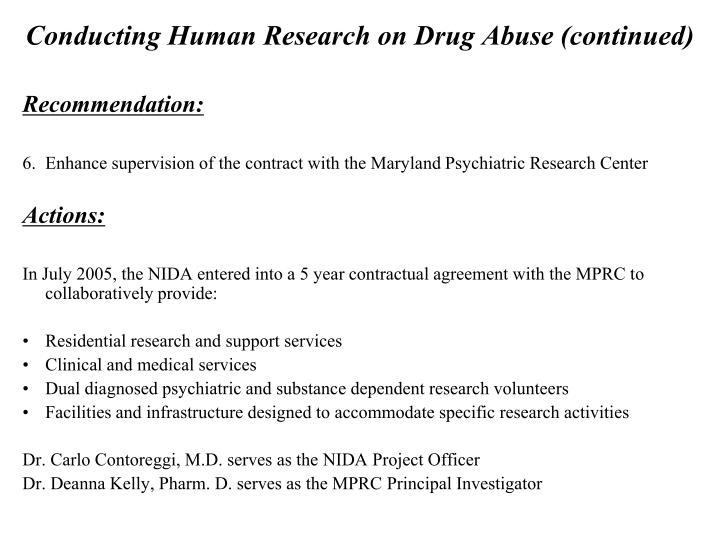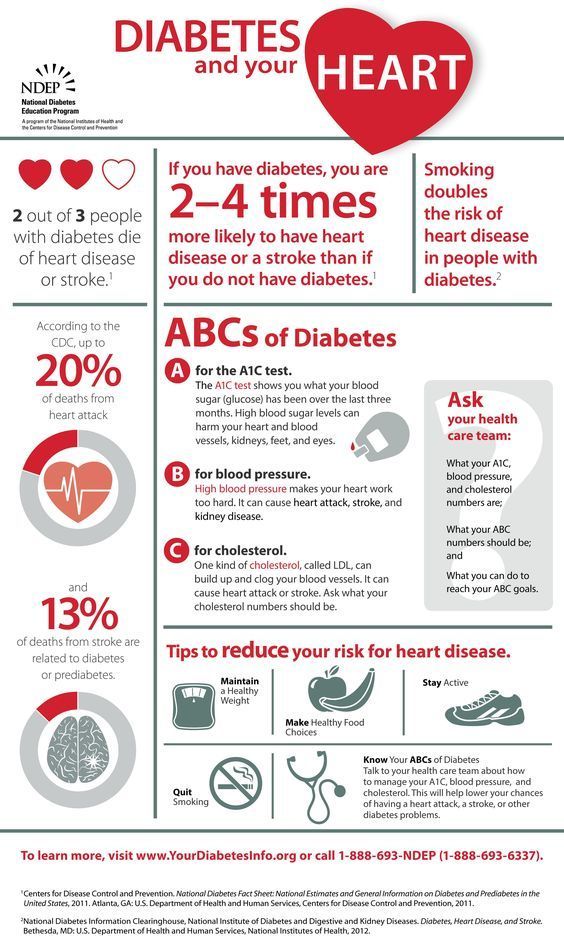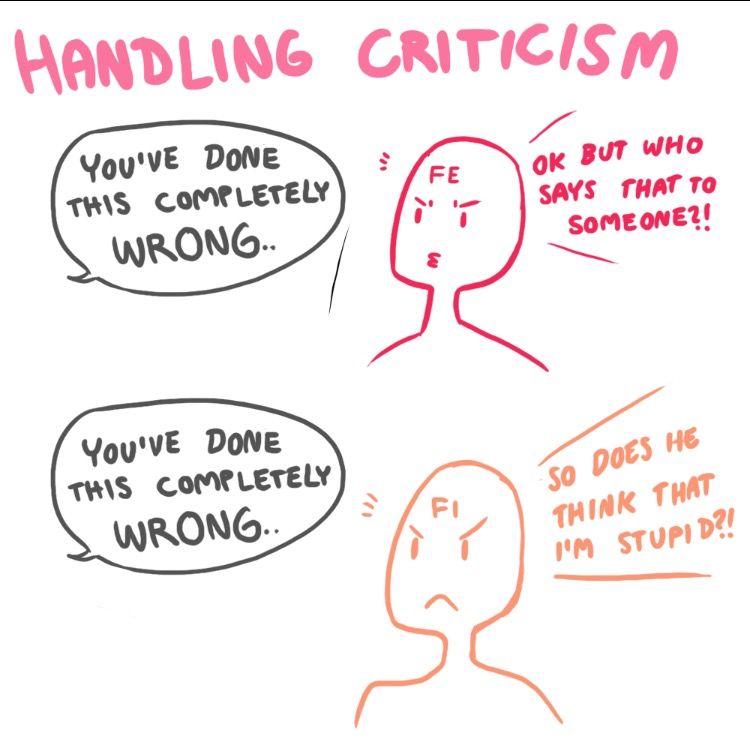How to get over overthinking
A psychotherapist shares the 3 exercises she uses every day 'to stop overthinking'
Westend61 | Getty Images
Overthinking is an anxious tendency that I encounter often in my psychotherapy practice. There are many ways we tend to overthink, such as rehashing the past — replaying the same scenario over and over in our head. Worrying is another form, in which we obsess over what the future might bring.
I can empathize. When I was younger, overthinking decreased my quality of life. Research has shown that overthinking can decrease energy, limit creativity and cause sleeping problems.
Eventually, I knew I needed a healthy way to cope, and I created a career out of helping other people do the same. Here are three strategies I use every day to stop overthinking:
1. Positive reframing
This is often confused with "toxic positivity," which asks people to think positively — no matter how difficult a situation is.
Positive reframing, on the other hand, allows you to acknowledge the negative aspects, then asks you to evaluate whether there's another way to think about the situation. Perhaps there are benefits or things you can change about it.
Example:
You constantly find yourself complaining: "I hate being a boss. On top of all these deadlines and responsibilities, it's hard to manage so many complex personalities. It's emotionally and mentally exhausting. My job just sucks."
Venting might feel good for a second, but it doesn't solve anything. And you'll likely continue to dwell on how much you hate your job or how bad you think you are at managing.
To practice positive reframing, replace the thought above with: "Things are challenging right now and I'm feeling disconnected from some things on my plate. I wonder if I can change anything about this situation or my expectations about it."
This thought pattern gives you the power to change your situation. You could start small by examining what important tasks needs to get done first, then either delay or delegate the rest until you are feeling less anxious. The key is to take a step back and deal with things one at a time.
2. Write down your thoughts once, then distract yourself for 24 hours
When our brains think we are in conflict or danger, a built-in alarm system goes off internally to protect us.
One thing I have found success with is writing down my feelings and waiting at least 24 hours (or just a few hours if it's an urgent matter) before replying or taking any sort of impulsive action.
Then, I put that draft away while I distract myself with another task.
Example:
You just received an email about something that went awry. You are upset, your heart starts to race, your breathing gets shallow, and you become hyper-focused on what's going wrong and why it's your fault.
If you respond to the email while your brain is in "alarm mode," you might say things you'll regret later on, which may then fuel the vicious cycle of overthinking.
Writing negative thoughts down takes the power out of them; I often don't feel the need to take action based on my anxious thoughts once I've written them down.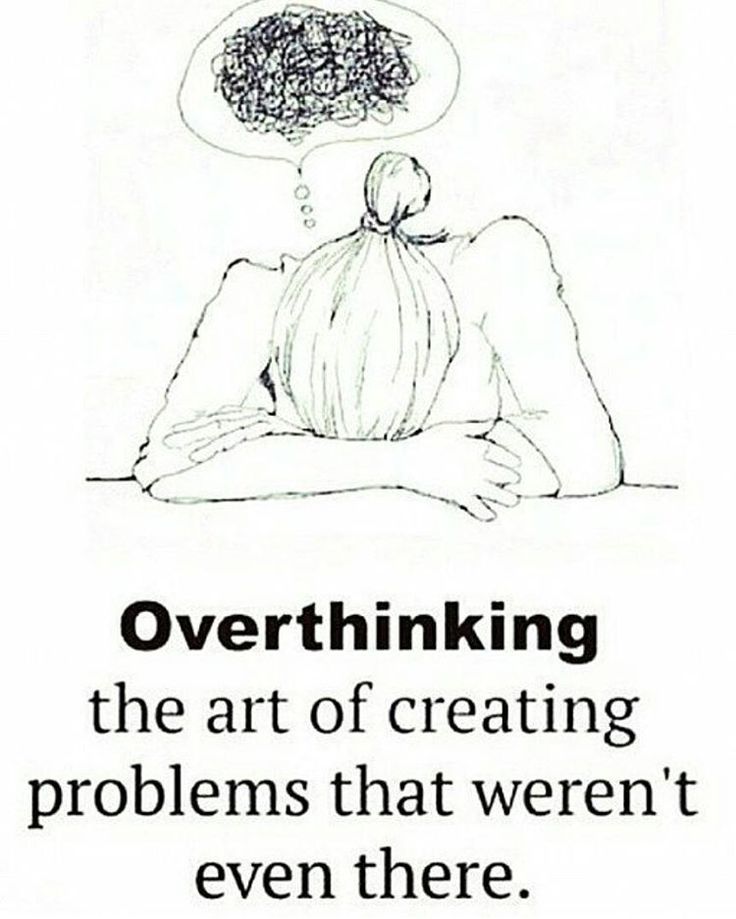
3. Practice 'specific gratitude'
In psychology, we know that expressing gratitude can increase our happiness. It can help us contextualize our frustrations against what we love and help us connect to something larger than ourselves — whether that's other people, animals, nature or a higher power.
But I find that repeating the same gratitude practice over and over again can become rote and diminish the returns. For me, it can start to feel like a meaningless chore instead of a mindful practice. So, I like to practice something that I call "specific gratitude."
Example:
Instead of writing in my journal every day that "I am grateful for my health," I'll write something like, "I am grateful that I woke up today without any back pain and have the ability to do today's workout."
This helps me stay focused on the here and now, rather than overthinking on general abstractions. Tomorrow, I might still be grateful for my health, but I might specifically be grateful that I have enough energy for a long run.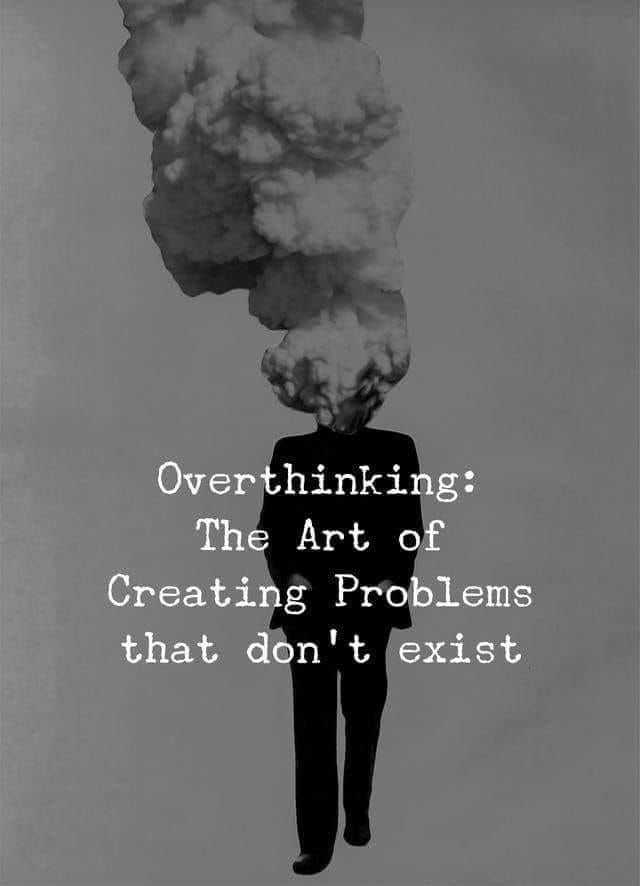
Jenny Maenpaa, LCSW, is a psychotherapist and founder of Forward in Heels, an intersectional feminist group therapy practice in New York City that empowers all women to stand tall and own their worth.
Don't miss:
- A neuroscientist shares the brain exercise she does for a stronger memory — and the mistake that can ‘harm’ it
- A Harvard nutritionist and brain expert shares the 5 foods she eats every day to sharpen her memory and focus
- A psychotherapist shares 24 conversation starters he uses to ‘build deeper, more interesting relationships’ with anyone
How to Stop Overthinking: 14 Strategies
Constant worrying and overthinking can often lead to issues with mental health and well-being. Techniques such as deep breathing, meditation, self-compassion, and asking for help from a healthcare professional can help alleviate the stress of overthinking.
You finally have a few quiet moments to yourself, only to immediately start wondering if you forgot to send that thank-you email or whether you’ve overestimated your chances of getting the promotion.
Sound familiar? Worrying and overthinking are part of the human experience, but when left unchecked, they can take a toll on your well-being. Dwelling on the same thoughts may even increase your risk of certain mental health conditions, according to 2021 research.
So, what’s an overthinking person to do? These tips can help you move in the right direction.
The way you respond to your thoughts can sometimes keep you in a cycle of rumination, or repetitive thinking. Rumination can often cause negative consequences to a person’s mental health.
The next time you find yourself continuously running things over in your mind, take note of how it affects your mood. Do you feel irritated, nervous, or guilty? What’s the primary emotion behind your thoughts?
Having self-awareness is key to changing your mindset.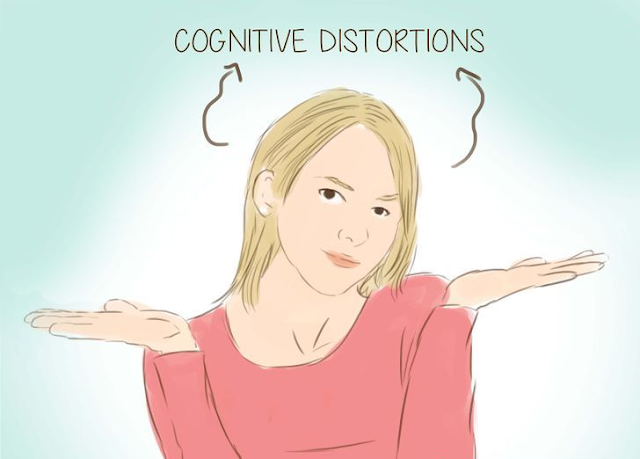
Shut down overthinking by involving yourself in an activity you enjoy.
This looks different for everyone, but ideas include:
- learning some new kitchen skills by tackling a new recipe
- going to your favorite workout class
- taking up a new hobby, such as painting
- volunteering with a local organization
It can be hard to start something new when you’re overwhelmed by your thoughts. If finding a distraction feels daunting, try setting aside a small chunk of time — say, 30 minutes — every other day. Use this time to either explore potential distractions or dabble in existing ones.
You’ve heard it a million times, but that’s because it works. The next time you find yourself tossing and turning over your thoughts, close your eyes and breathe deeply.
Try it
Here’s a good starter exercise to help you unwind with your breath:
- Find a comfortable place to sit and relax your neck and shoulders.
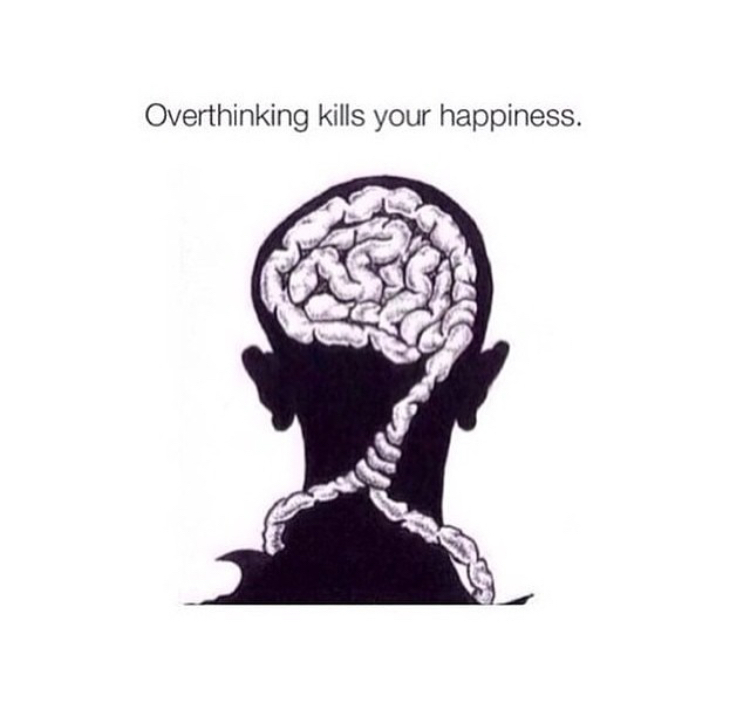
- Place one hand over your heart and the other across your belly.
- Inhale and exhale through your nose, paying attention to how your chest and stomach move as you breathe.
Try doing this exercise 3 times a day for 5 minutes, or whenever you have racing thoughts.
Developing a regular meditation practice is an evidence-backed way to help clear your mind of nervous chatter by turning your attention inward.
All you need is 5 minutes and a quiet spot.
How will all the issues floating around in your mind affect you 5 or 10 years from now? Will anyone really care that you bought a fruit plate for the potluck instead of baking a pie from scratch?
Don’t let minor issues turn into significant hurdles.
Trying to ease the load for someone else can help you put things in perspective. Think of ways you can be of service to someone going through a difficult time.
Does your friend who’s in the middle of a divorce need a few hours of child care? Can you pick up groceries for your neighbor who’s been sick?
Realizing you have the power to make someone’s day better can keep negative thoughts from taking over. It also gives you something productive to focus on instead of your never-ending stream of thoughts.
It also gives you something productive to focus on instead of your never-ending stream of thoughts.
Automatic negative thoughts (ANTs) refer to knee-jerk negative thoughts, usually involving fear or anger, you sometimes have in reaction to a situation.
Tackling ANTs
You can identify and work through your ANTs by keeping a record of your thoughts and actively working to change them:
- Use a notebook to track the situation giving you anxiety, your mood, and the first thought that comes to you automatically.
- As you dig into details, evaluate why the situation is causing these negative thoughts.
- Break down the emotions you’re experiencing and try to identify what you’re telling yourself about the situation.
- Find an alternative to your original thought. For example, instead of jumping straight to, “This is going to be an epic failure,” try something along the lines of, “I’m genuinely trying my best.”
When you’re in the midst of overthinking, stop and take out your notebook or your favorite note-taking app on your phone. Jot down five things that have gone right over the past week and your role in them.
Jot down five things that have gone right over the past week and your role in them.
These don’t need to be huge accomplishments. Maybe you stuck to your coffee budget this week or cleaned out your car. When you look at it on paper or on-screen, you might be surprised at how these little things add up.
If it feels helpful, refer back to this list when you find your thoughts spiraling.
Not ready to commit to a meditation routine? There are plenty of other ways to ground yourself in the present moment.
Be here now
Here are a few ideas:
- Unplug. Shut off your computer or phone for a designated amount of time each day, and spend that time on a single activity.
- Eat mindfully. Treat yourself to one of your favorite meals. Try to find the joy in each bite, and really focus on how the food tastes, smells, and feels in your mouth.
- Get outside. Take a walk outside, even if it’s just a quick lap around the block.
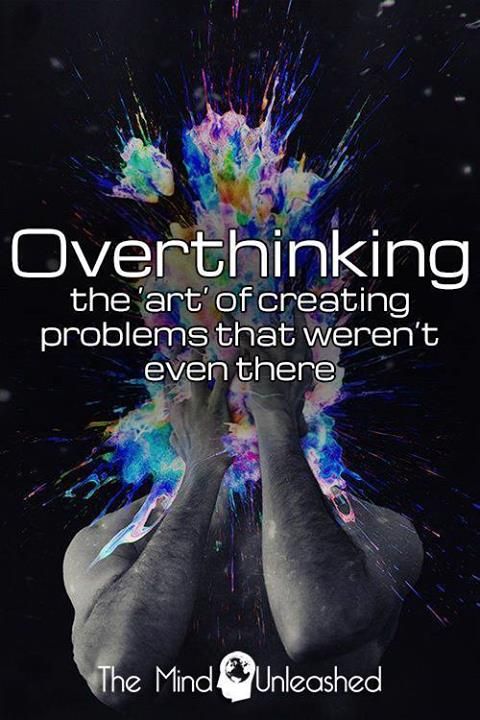 Take inventory of what you see along the way, noting any smells that waft by or sounds you hear.
Take inventory of what you see along the way, noting any smells that waft by or sounds you hear.
Sometimes, quieting your thoughts requires stepping outside of your usual perspective. How you see the world is shaped by your life experiences, values, and assumptions. Imagining things from a different point of view can help you work through some of the noise.
Jot down some of the thoughts swirling around in your head. Try to investigate how valid each one is. For example, maybe you’re stressing about an upcoming trip because you just know it’s going to be a disaster. But is that really what’s going to happen? What kind of proof do you have to back that up?
Sometimes, you might go over the same thoughts repeatedly because you aren’t taking any concrete actions about a certain situation.
Can’t stop thinking about someone you envy? Instead of having it ruin your day, let your feelings help you make better choices.
The next time you’re visited by the green-eyed monster, be proactive and jot down ways you can go about reaching your goals.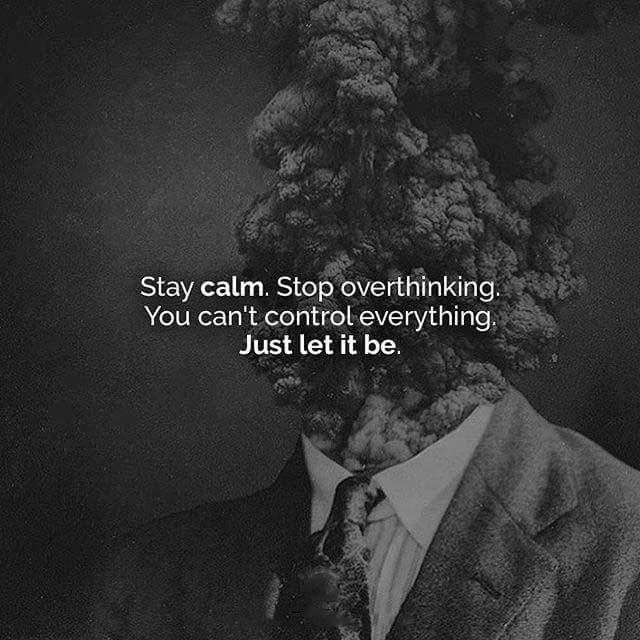 This will get you out of your head and channel your energy into taking actionable steps.
This will get you out of your head and channel your energy into taking actionable steps.
Dwelling on past mistakes keeps you from letting go. If you’re beating yourself up over something you did last week, try refocusing on self-compassion.
Here are some ways to get you started:
- Take note of a stressful thought.
- Pay attention to the emotions and bodily responses that arise.
- Acknowledge that your feelings are true for you in the moment.
- Adopt a phrase that speaks to you, such as “May I accept myself as I am” or “I am enough.”
Some things will always be out of your control. Learning how to accept this can go a long way toward curbing overthinking. One study from 2018 shows that accepting negative thoughts and fears can help improve psychological health.
Of course, this is easier said than done, and it won’t happen overnight. But look for small opportunities where you can confront the situations you frequently worry about.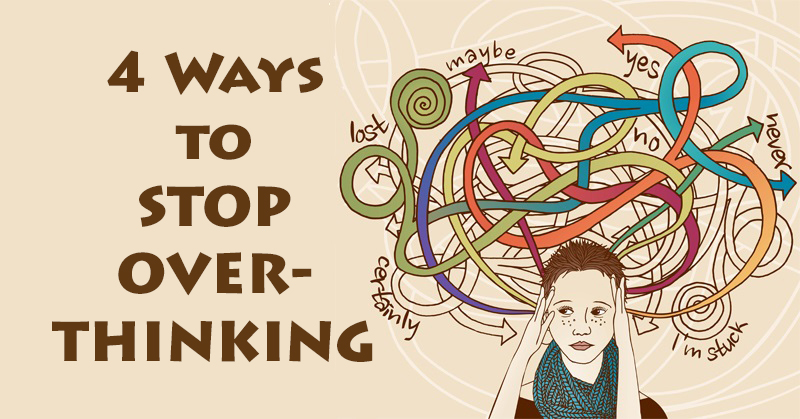 Maybe it’s standing up to a bossy co-worker or taking that solo day trip you’ve been dreaming of.
Maybe it’s standing up to a bossy co-worker or taking that solo day trip you’ve been dreaming of.
You don’t have to go it alone. Seeking outside help from a qualified therapist can help you develop new tools for working through your thoughts and even changing your mindset.
Our guide to affordable therapy can get you started.
How to stop thinking about a person: 5 tips from a psychologist
Health
© MART PRODUCTION/Pexels
Author Alexander Artamonov
April 23, 2022
Obsession with a former partner or a person who does not reciprocate can unsettle, but it is not so difficult to cope with it
Dramatically broken relationships and broken hearts in the practice of psychologists are quite common. Often, after unpleasant events, the image of a person does not leave the head for a long time, and disappointment only feeds constant thoughts about him. But sooner or later, a new life will begin - we tell you how to bring this moment closer and benefit from experiences.
- Why a person does not get out of his head
- How to stop thinking about a person
- What to do if nothing helps
Margarita Eremina, psychologist, psychotherapist at the Center for Cognitive Therapy;
Svetlana Makhova, psychotherapist, specialist of the service for the selection of psychologists Alter
Advertising on RBC www.adv.rbc.ru
Why a person doesn't get out of your head
You want to forget about a person, but he doesn't get out of your head. You do not find a place for yourself from these obsessive thoughts. It may seem that you are going crazy - but psychologists say that in general this is a completely normal state.
Margarita Eremina, psychologist, psychotherapist, Center for Cognitive Therapy
“For a person, a relationship does not end when a physical separation occurs. There is a natural process of mourning. We can continue to have dialogues with this person in our head, constantly remember him. This does not mean that there is something wrong with us. After all, most likely, we are talking about someone significant, about a person with whom we had an important relationship, an attachment was formed that cannot disappear in one moment. If the relationship was long, then this period of mourning can last about a year. Gradually, the acute phase will inevitably pass - then you can begin to change your life: try new things and meet new people.
This does not mean that there is something wrong with us. After all, most likely, we are talking about someone significant, about a person with whom we had an important relationship, an attachment was formed that cannot disappear in one moment. If the relationship was long, then this period of mourning can last about a year. Gradually, the acute phase will inevitably pass - then you can begin to change your life: try new things and meet new people.
Svetlana Makhova, psychotherapist, specialist of the service for the selection of psychologists Alter
“A person can not get out of your thoughts because of the Zeigarnik effect. This is a phenomenon in which unfinished actions and events are deposited in memory in the first place. In the case of another person, this works if you have unfulfilled expectations from him, which either have not yet been fulfilled, or which are not destined to happen in principle - as in the case of a breakup or unrequited love.
In addition to situations related to romantic relationships, a person may not get out of your thoughts for several other reasons:
- if you are involved in solving the problems of another and expect mutual help from him;
- if you feel guilty towards another;
- if you are impressed, intrigued by someone, but could not understand him;
- if you expect certain things from a person.
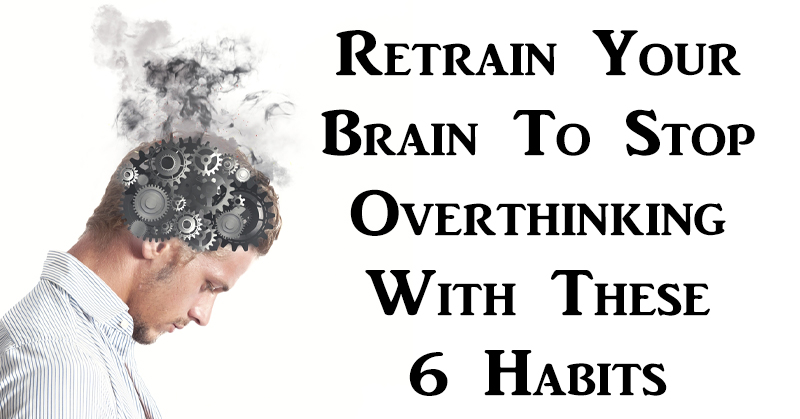 ”
”
How to stop thinking about a person
The first step is to accept the fact that constantly thinking about a person in such a situation is natural, and stop forcing yourself to get rid of such thoughts
© Nik Shuliahin/Unsplash
1. Stop forcing yourself not to think
“The first step is to accept the fact that constantly thinking about a person in such a situation is natural, and stop forcing yourself to get rid of such thoughts. Often such memories and thoughts can be painful. But it is important to allow yourself to live through this pain in order to move on. It is perfectly normal if the memories can come in a painful wave from time to time. The main thing is that each time these waves become smaller, and one stage of mourning is replaced by another.
2. Accept the current situation as a fact
In order to overcome difficulties, you must first come to terms with their existence. For example, if we are talking about a breakup, you need to accept that it happened, let the person go and start living on.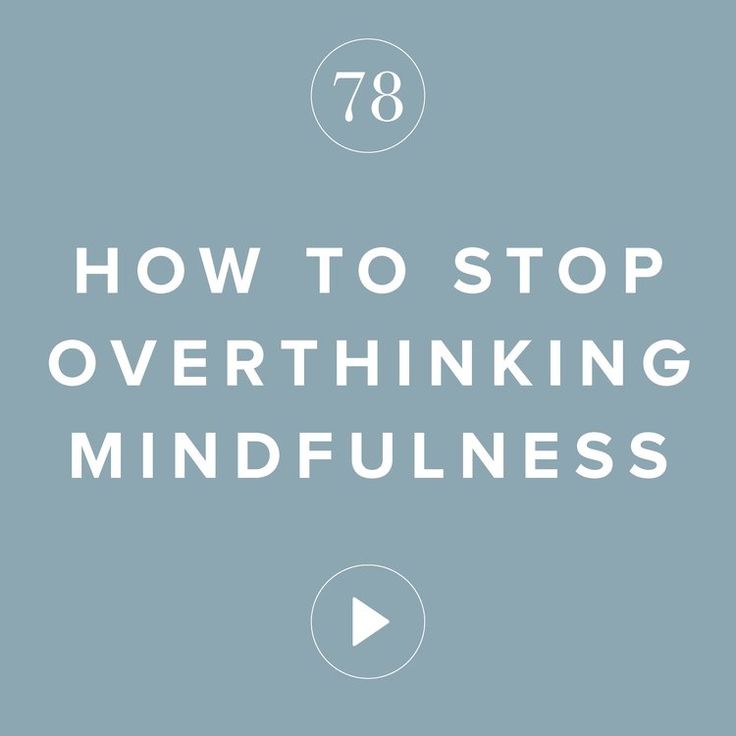
Svetlana Makhova:
“It is very important to mourn what has been lost, to grieve that it never happened. Accept the fact that this person is no longer in your life. Our expectations generate potential for action. And this potential does not dry up until we either consciously give up what we want because of irrelevance, or we don’t get it, that is, we don’t close the gestalt. Suppressed emotions, unexpressed resentments, remorse and guilt often do not give us the opportunity to act: either get closer to a person or let him go.
3. Reflect on relationships
It is important to structure your thoughts about a person and make them part of your experience
© Giulia Bertelli/Unsplash
Often in such thoughts a person appears as the sum of his own extremes - either bad or good. Often this picture is not true and confuses us. It is important to structure your thoughts about the person and make them part of your experience.
Svetlana Makhova:
“If you are going through a breakup, take a sheet of paper and divide it into two columns. In one, express your indignation, write down everything that you could not get in this relationship. In another column, write about what was good for you with this person and what you lost. Thanks to the experience you had with him, here is a list of what is important to get in a relationship - it will come in handy when you start building new ones.
In one, express your indignation, write down everything that you could not get in this relationship. In another column, write about what was good for you with this person and what you lost. Thanks to the experience you had with him, here is a list of what is important to get in a relationship - it will come in handy when you start building new ones.
Margarita Eremina:
“It will be useful to find answers to questions about what was important in these relationships. What is missing now? What was not said, not spoken? What are the exact moments you return to in your thoughts?
4. Let go of the thought that it happened because of your qualities
Very often, people who experience rejection or a relationship breakup start looking for the reason in their shortcomings
© Kelly Sikkema/Unsplash
Often people who are faced with rejection or a breakup of relationships begin to look for the cause in their shortcomings. This is a simple explanation that is easy to accept, but it does not always correspond to the truth and sometimes only prevents you from drawing the right conclusions from the situation.
Svetlana Makhova:
“People who were often told in their childhood, “You will get what you want if you behave well, do what you are told,” are especially inclined to think like this.” In adulthood, they continue to believe that if they behave well, then no one will be able to refuse them. But it's important to realize that there is no correlation between failure and being "good." We may be refused because the other does not have the opportunity, he does not want or cannot give what he wants. Refusal is the will of the other, which must be respected. And remember that a direct rejection empowers us - we have a chance to knock on other doors.
5. Don't count on reciprocity by default
Some people tend to think that if they help another person, that person should reciprocate. But often in life everything is much more complicated, and if we do not get what we expect from a person, then we fixate on him.
Svetlana Makhova:
“A person may not be able or willing to pay the price you expect from him in gratitude for his help.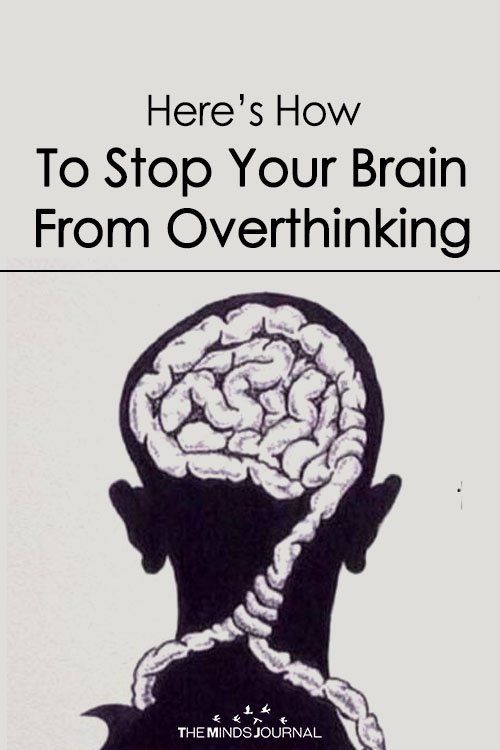 Therefore, before entering into a relationship, it is important to be clear about mutual expectations. The same rule applies when you are intrigued by someone. Do not fantasize about what he meant - instead, just ask the person about his intentions, express your feelings to him.
Therefore, before entering into a relationship, it is important to be clear about mutual expectations. The same rule applies when you are intrigued by someone. Do not fantasize about what he meant - instead, just ask the person about his intentions, express your feelings to him.
What to do if nothing helps
If the acute phase of mourning does not go away, then depression can set in, and the sooner help is sought, the sooner the person will feel better
© Cottonbro/Pexels
It's been a long time, but the grief never passed, the obsessive thoughts about the person did not disappear, and perhaps only became even more painful. What to do? Experts agree that it is worth going to a psychologist.
Margarita Eremina:
“If the acute phase of mourning does not go away, depression can set in, and the sooner he seeks help, the sooner he will feel better.”
Svetlana Makhova:
“A psychologist will help you express your feelings, find the source of potential — your hidden, but never fulfilled desires, and close the gestalt — let go or fulfill what you want.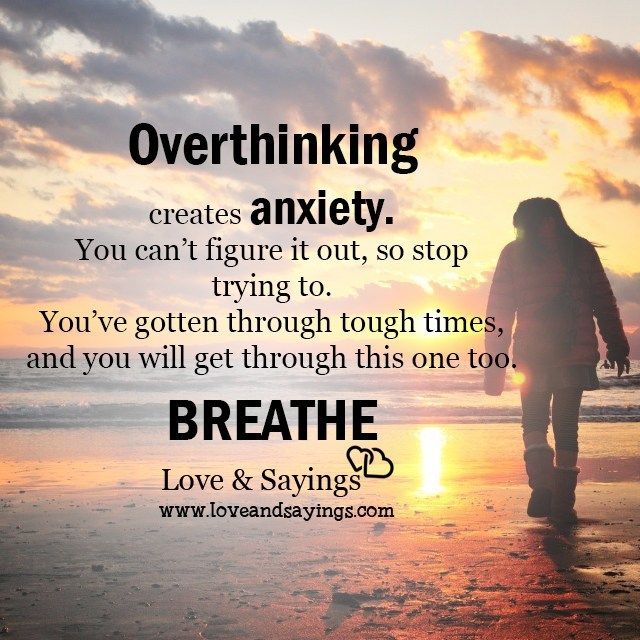 ”
”
Tags: psychology , relationship
How to stop thinking about unpleasant things
International best-selling author and psychotherapist Ilse Sand offers a simple guide for those who want to live in harmony with themselves in a world full of extroverts. Her advice will help you gain confidence in yourself, accept your psychological limitations and use your strengths. Proposed in the book “The Distance of Happiness. Rules of harmonious life for introverts and hypersensitive people" recommendations are relevant not only for introverts and hypersensitive people, but also for those who find themselves in a difficult situation due to stress, psychological trauma or emotional burnout.
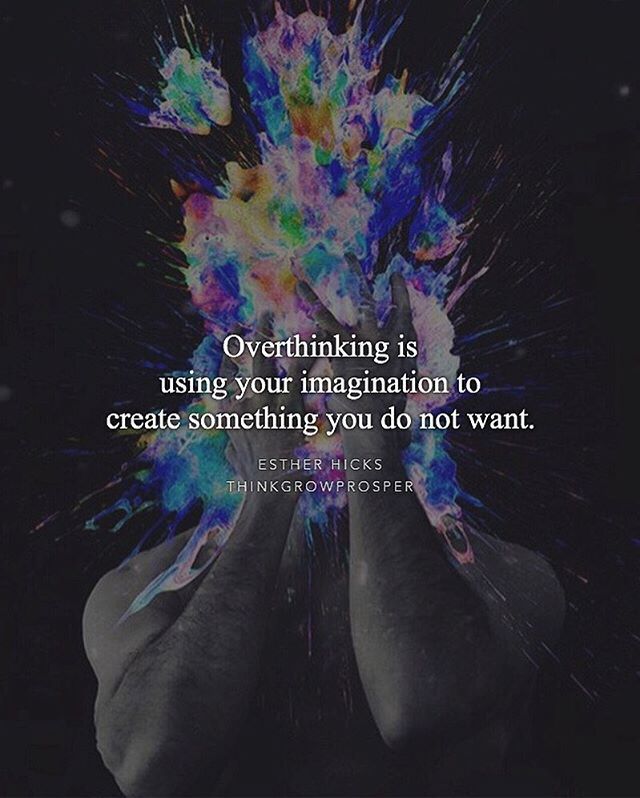 We are publishing an excerpt from the book that will help you stop thinking about the unpleasant.
We are publishing an excerpt from the book that will help you stop thinking about the unpleasant.
Ilse Sand
Alpina Publisher, 2020
It is important for impressionable people to be prepared for two scenarios - the worst and the best - in order to reduce the risk of psychological overload. Many introverts and hypersensitive individuals try to mentally and physically prepare for the upcoming event. If you scroll through all the possible results in your head in advance and even plan actions in a given situation, you will feel calmer and more confident. Plus, you'll be less tired.
Some introverts and hypersensitive people have such a rich imagination that they often exaggerate too much: “But what if war starts in Denmark? What if a nuclear war breaks out? What if climate change causes sudden natural disasters? What if someone close to you catches a serious illness, becomes disabled or has a serious accident?”
There is nothing wrong with having gloomy thoughts about the future from time to time
Perhaps they will encourage you to thank fate for avoiding such situations. However, you should not take other people's troubles and accidents to heart, otherwise you will not be able to get rid of remorse.
However, you should not take other people's troubles and accidents to heart, otherwise you will not be able to get rid of remorse.
If disaster is unavoidable, a backup plan will hardly help you, since reality will be far from your calculations. Therefore, when gloomy thoughts arise, I recommend that you discard them with the words: “Even in the worst scenario, I can handle it.” Perhaps you will benefit from what happened. For example, you will fight adversity, standing shoulder to shoulder with people who will later become your friends for life.
When you imagine this or that catastrophe, there is nothing worse than projecting it onto yourself frame by frame and feeling helpless. If you are in trouble, but at the same time you can act, then later, with only rare exceptions, you will not be as scared as the first time.
Being an introvert or hypersensitive person, you may find it difficult to deal with the situation. But this is not so. Austrian professor of neurology and psychiatry of Jewish origin Viktor Frankl spent three years in Nazi concentration camps. He realized that in the most terrible conditions, those people who are able to find the meaning of life in spite of suffering are best kept: for example, they can help those in need, and introverts and hypersensitive individuals are especially successful in this. So don't think that you will be less likely to survive if something bad happens. Perhaps, at the most crucial moment, you will show your creative abilities in some other way, gain a deeper meaning of life and connect yourself with love and understanding with the people around you. The same goes for death.
He realized that in the most terrible conditions, those people who are able to find the meaning of life in spite of suffering are best kept: for example, they can help those in need, and introverts and hypersensitive individuals are especially successful in this. So don't think that you will be less likely to survive if something bad happens. Perhaps, at the most crucial moment, you will show your creative abilities in some other way, gain a deeper meaning of life and connect yourself with love and understanding with the people around you. The same goes for death.
It is necessary to understand that every person's life comes to an end. The main thing is to think less about tragedy and loss
For example, if you think that as you get older you will have more and more wrinkles on your face, that you will become less attractive, and that you may have many age-related diseases, it will affect your mood in life.
How to look at life from the bright side and successfully deal with stress? Learn this in the Antifragility course.
Imagine a bright future
It is good to prepare for the worst and act according to the plan. The same applies to the last years of life and death itself. Perhaps you have saved up some money for retirement, looked after housing with a minimum number of stairs, take care of your health and keep yourself in good shape. In no case do not constantly think about illnesses and other troubles. Try to think about something good. Most older people don't care what other people think. They are more sincere, straightforward and not afraid to show themselves in all their glory.
Increased self-confidence allows them to get closer to a stranger.
Just imagine how much brighter your life would be if you gave up perfectionism and demanded less from yourself. Hope always dies last, even if you spend the rest of your life exhausted in a hospital bed or in a nursing home. It's never too late to show your true feelings for others. Sometimes it’s even easier when death breathes down your back and masks fall off your faces.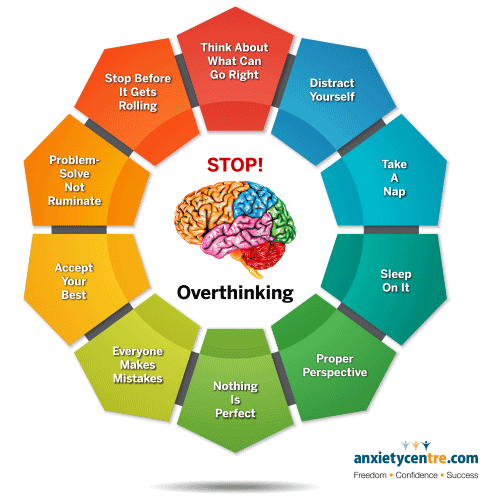
You can prepare for your own death by asking questions from time to time: “How will I be remembered after death? What will I see behind me, summing up my own life? This will help you prioritize the future.
We do not know exactly what happens at the moment of death and what to expect after it, so we should think about the good. Try to be inspired by the memories of people whose lives hung in the balance. There are many books in which people share their impressions of near-death experiences. Most talk about bright light, love and harmony.
It makes no sense to think of death as a big black hole. It's too dry and insensitive, I think. If your ideas about death make you feel uneasy, use your imagination by using all your creativity and imagine a pleasant and beautiful place.
In the "Open Reading" section, we publish excerpts from books in the form in which they are provided by the publishers. Minor abbreviations are indicated by ellipsis in square brackets.
